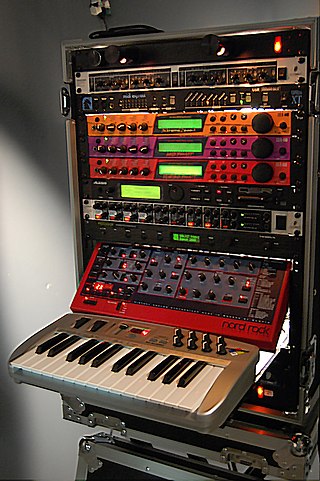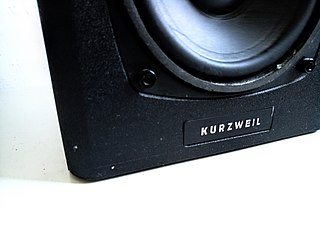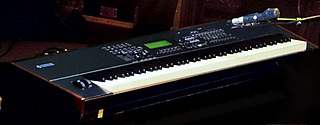
MIDI is a technical standard that describes a communication protocol, digital interface, and electrical connectors that connect a wide variety of electronic musical instruments, computers, and related audio devices for playing, editing, and recording music.

Digital music technology encompasses the use of digital instruments to produce, perform or record music. These instruments vary, including computers, electronic effects units, software, and digital audio equipment. Digital music technology is used in performance, playback, recording, composition, mixing, analysis and editing of music, by professions in all parts of the music industry.
A music workstation is an electronic musical instrument providing the facilities of:

An electronic keyboard, portable keyboard, or digital keyboard is an electronic musical instrument based on keyboard instruments. Electronic keyboards include synthesizers, digital pianos, stage pianos, electronic organs and digital audio workstations. In technical terms, an electronic keyboard is a rompler-based synthesizer with a low-wattage power amplifier and small loudspeakers.

Novation Digital Music Systems Ltd. is a British musical equipment manufacturer, founded in 1992 by Ian Jannaway and Mark Thompson as Novation Electronic Music Systems. Today the company specializes in MIDI controllers with and without keyboards, both analog and virtual analog performance synthesizers, grid-based performance controllers, and audio interfaces. At present, Novation products are primarily manufactured in China.
Keytar is a keyboard instrument similar to a synthesizer or MIDI controller that is supported by a strap around the neck and shoulders, similar to the way a guitar is held.

Kurzweil Music Systems is an American company that produces electronic musical instruments. It was founded in 1982 by Stevie Wonder (musician), Ray Kurzweil (innovator) and Bruce Cichowlas.
The Yamaha AN1x is a DSP-based analog modeling synthesizer, produced by Yamaha Corporation from 1997 to 1998, and was marketed as an "analog physical modelling control synthesizer".

A MIDI controller is any hardware or software that generates and transmits Musical Instrument Digital Interface (MIDI) data to MIDI-enabled devices, typically to trigger sounds and control parameters of an electronic music performance. They most often use a musical keyboard to send data about the pitch of notes to play, although a MIDI controller may trigger lighting and other effects. A wind controller has a sensor that converts breath pressure to volume information and lip pressure to control pitch. Controllers for percussion and stringed instruments exist, as well as specialized and experimental devices. Some MIDI controllers are used in association with specific digital audio workstation software. The original MIDI specification has been extended to include a greater range of control features.

A sound module is an electronic musical instrument without a human-playable interface such as a piano-style musical keyboard. Sound modules have to be operated using an externally connected device, which is often a MIDI controller, of which the most common type is the musical keyboard. Another common way of controlling a sound module is through a sequencer, which is computer hardware or software designed to record and playback control information for sound-generating hardware. Connections between sound modules, controllers, and sequencers are generally made with MIDI, which is a standardized interface designed for this purpose.

A MIDI keyboard or controller keyboard is typically a piano-style electronic musical keyboard, often with other buttons, wheels and sliders, used as a MIDI controller for sending Musical Instrument Digital Interface (MIDI) commands over a USB or MIDI 5-pin cable to other musical devices or computers. MIDI keyboards lacking an onboard sound module cannot produce sounds themselves, however some models of MIDI keyboards contain both a MIDI controller and sound module.

The Yamaha Motif is a series of music workstation synthesizers, first released by Yamaha Corporation in August 2001. The Motif replaced the EX series in Yamaha's line-up and was also based on the early Yamaha S series. Other workstations in the same class are the Korg Kronos and the Roland Fantom G. The series' successor is Yamaha Montage, released in 2016, followed up by the Yamaha Montage M in 2023.
Arturia is a French electronics company founded in 1999 and based in Grenoble, France. The company designs and manufactures audio interfaces and electronic musical instruments, including software synthesizers, drum machines, analog synthesizers, digital synthesizers, MIDI controllers, sequencers, and mobile apps.
EWI is a type of wind controller, an electronic musical instrument invented by Nyle Steiner. The EWI has been used by many artists across many different genres.
M-Audio is a business unit of inMusic Brands that designs and markets audio and MIDI interfaces, keyboards and MIDI controllers, synthesizers, loudspeakers, studio monitors, digital DJ systems, microphones, and music software. The company has independent offices in the US, Canada, UK, Germany, France and Japan.

A wind controller, sometimes referred to as a wind synthesizer, is an electronic wind instrument. It is usually a MIDI controller associated with one or more music synthesizers. Wind controllers are most commonly played and fingered like a woodwind instrument, usually the saxophone, with the next most common being brass fingering, particularly the trumpet. Models have been produced that play and finger like other acoustic instruments such as the recorder or the tin whistle. The most common form of wind controller uses electronic sensors to convert fingering, breath pressure, bite pressure, finger pressure, and other gesture or action information into control signals that affect musical sounds. The control signals or MIDI messages generated by the wind controller are used to control internal or external devices such as analog synthesizers or MIDI-compatible synthesizers, synth modules, softsynths, sequencers, or even non-instruments such as lighting systems.

A guitar synthesizer is any one of a number of musical instrument systems that allow a guitarist to access synthesizer capabilities.

A synthesizer is an electronic musical instrument that generates audio signals. Synthesizers typically create sounds by generating waveforms through methods including subtractive synthesis, additive synthesis and frequency modulation synthesis. These sounds may be altered by components such as filters, which cut or boost frequencies; envelopes, which control articulation, or how notes begin and end; and low-frequency oscillators, which modulate parameters such as pitch, volume, or filter characteristics affecting timbre. Synthesizers are typically played with keyboards or controlled by sequencers, software or other instruments, and may be synchronized to other equipment via MIDI.

The Yamaha Music SynthesizerS90 is a synthesizer and a MIDI controller in one unit, released in 2002 to supersede the S80. As such, it is part of the S series together with the S03 and S08. It was superseded by the S90ES in 2005, itself superseded by the S90XS in 2009.













